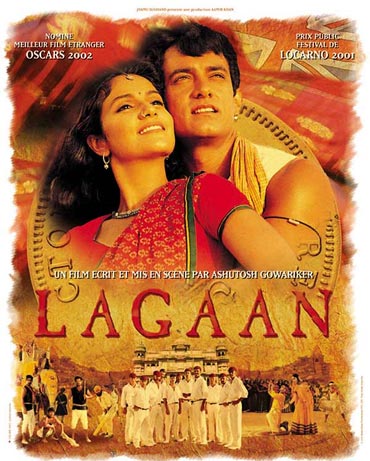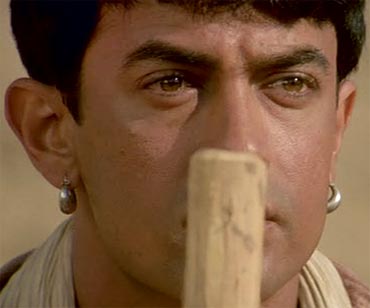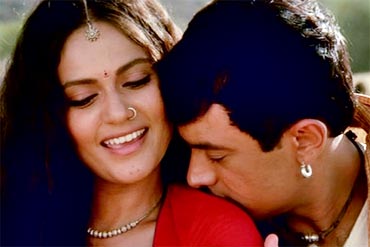
Aamir Khan's blockbuster Lagaan was released 10 years ago on June 15. We celebrate the film.
Satyajit Bhatkal, who made Madness in the Desert a national award winning documentary on the making of Lagaan, shares his experience of being part of this landmark movie with Abhishek Mande and Sonil Dedhia.
How did you get involved with Lagaan?
I was a lawyer and I'd seen people at their most vulnerable moments.
So after practicing for 10 years, I realised I had a story to tell.
Besides I had reached a stage in my life where wanted to do something different.
I was trying to figure out if I could express all my experiences creatively. At the time I had written three episodes (of a show that would become) Bombay Lawyers. I'd read it out to Aamir (Khan) who'd promised to produce it.
But at the time Lagaan was taking off so we decided to drop it and take it up again after Lagaan.
At that point they (Aamir Khan and co) were struggling to put together a good production team.
So Aamir asked (his then wife) Reena (Datta) to speak with me. I was not sure but Aamir convinced me that it would help me to be in a learning environment where I'd be watching a film being made.
I started shooting (the documentary) soon after. Everything on the set was new to me (because I had nothing to do with filmmaking before this).
As I began shooting interviews with the cast and crew -- and I even interviewed people who cleaned toilets and those who cooked food - I realised that everyone wanted to be in films. And that was a fantastic revelation.

Could you describe to us the mood on the sets of Lagaan?
Ashutosh (Gowariker) was deeply convinced that he was making the greatest film ever made and he was able to convey that confidence -- even in the worst of the times -- that this film is huge. Never for a moment did he waiver in his conviction.
And 10 years later nothing has changed to waiver that position.
Lagaan was the turning point in Hindi cinema.
If you look at it from the point of view of a historian you have to look at (the industry as it was) pre-Lagaan to understand its importance.
The biggest film (soon) before Lagaan was Mohabbatein. (Then there was) Kabhi Khushi Kabhie Gham. You had crap ruling.
Look at Aamir's crap too like Raja Hindustani
Yes. And at the time of Lagaan, Aamir had emerged from three not-so-successful films Mann, Mela and 1947:Earth.
Mela released while we were in Bhuj. We had booked the theatre. On the way back there was silence in the bus. No one was saying anything.
You are right in saying it was a lean patch (because) he had two flops the third one was 1947 Earth, which was not exactly Aamir's movie. But he doesn't perceive it that way.
Mann was a setback and Mela was a film he didn't really have his heart in. So he was still riding on Sarfarosh (which was a hit).
When he entered Lagaan, he wasn't on the back foot at all. The audience also perceived it as a superstar's film.
Would you agree that after Lagaan, he focussed more seriously on his career than he did before?
I agree with you but I don't think he will agree with you.

How did Lagaan change things in Bollywood?
Lagaan's biggest contribution was that it made it possible for different concerns to occupy the central stage in mainstream cinema.
Before Lagaan, the primary concern in Bollywood was boy-meets-girl and its variations. So all kinds of hit films with the exception of Salim-Javed's 'Angry Young Man' phase boy-meets-girl theme ruled.
Everything else was (considered) art cinema. So nothing else could be a concern.
For instance nobody had a profession, we never knew what the hero did to earn a living etc.
Lagaan made that possible. The romance was incidental to the film.
It made other concerns important. The moment you have other concerns, characters become important. Otherwise it all boils down to how well you have made the star look.
There were character actors and stars and stars didn't play characters. They were themselves.
Lagaan broke all these rules.
So when a story of a dhoti-clad man in 19th century drought and poverty-stricken India who spoke not in Hindustani but Avadhi and whose concern was how to pay tax and for that plays a cricket match becomes mainstream and a hit so many doors and windows open.
(Today because of that) you can make a film is like No One Killed Jessica or Rang De Basanti or Taare Zameen Par. No one thought it was possible to make films like these before Lagaan.
So a lot of the new concerns (like the ones in) Dibakar Banerjee's films like Khosla Ka Ghosla or Oye Lucky, Lucky Oye became possible because the atmosphere created by Lagaan.
(It also made) the producers realise that there is no 'formula'.
The concerns of the mainstream changed.
Yash Raj made films like Chak De! India or Rocket Singh Salesman of the Year.
Karan Johar made film on the themes of the breakdown of marriage as in Kabhi Alvida Na Kehna or My Name is Khan. Even as a producer, Karan backed a film like Wake up Sid, which is a coming of age film where a young boy grows up (and discovers his identity).
I think Lagaan did all that and finished off alternate cinema. (Alternate cinema) had become mainstream.
Today there is nothing such as a 'safe film'. There is no formula left. All you have to do is to make a film that people want to watch.
That can be about the love life of an ant if you know how you can make it entertaining. People today are open to listening to all kinds of ideas.
No one was willing to touch Ashutosh's (Lagaan) script for four years. That wouldn't happen today.

It is a better film industry to work in than it was ten years ago?
I wasn't in the industry then but my guess is it must have been a horror ten years ago.
Today it may not be easy to break into the industry but it shouldn't be.
Also I strongly suspect it is much better than it was. Look at me, I got an opportunity to make a film like Zokkomon.
Of course there are issues, problems and challenges but the bigger picture is that at least one gets the opportunity.
The question is do you have an interesting story to tell. It doesn't matter what that story is about.
None of this was possible before Lagaan.
Do you remember this movie called New Delhi Times (released in 1986 starring Shashi Kapoor)? No One Killed Jessica falls in that category. At that time New Delhi Times may have got a limited release. Today Jessica becomes a huge hit.
You've mentioned in an interview that you decided to shoot a documentary when you realised that there was something special happening. What was that something?
Drama and theatre! I sensed there was something dramatic happening.
Lagaan was an ambitiously conceived film and it was impeccably planned. So much so we knew where we would shoot on what day and what props would be needed.
Despite all this planning though things went wrong. When things go wrong you have drama, contradictions, conflicts, disagreement and yet despite it all everyone perseveres and keeps going for the larger goal. So it is a dramatic situation and full of possibilities. It had all the elements of good story telling.
Good story telling is based on two things -- conflict and characters.
I knew I had both. All I need to make sure was to be there shooting it.

What would you say your learnings have been during the making of Lagaan?
Lagaan was a great place to learn about teamwork and Aamir is a master in that.
Even Ashutosh is good (in building a great team) but he was creative captain of the ship and had many things on his mind.
Aamir built the team, kept them motivated and kept them together. His man management skills are incredible and it is based primarily on leading by example. There is no limit to the extent of effort that he will make and therefore inspire everyone else to make in order to get everything right.
Once you do (a film like) Lagaan and you are convinced you can do everything because you've just seen someone do the impossible.
When you make a film like Lagaan there are thousands of things one must get right so one cannot let one's guard down and vigilance down. How keep one's guard and vigilance up continuously was my other greatest learning.